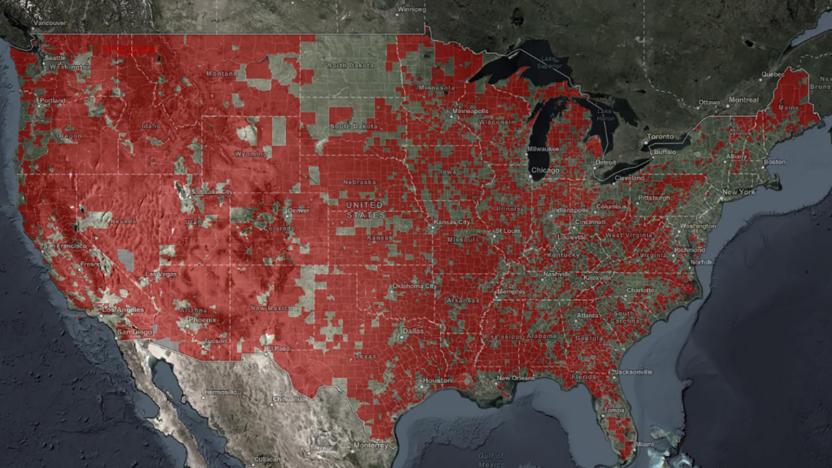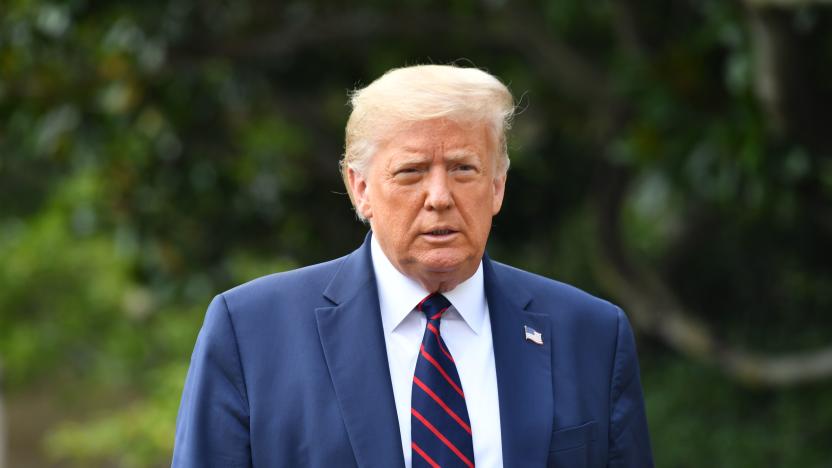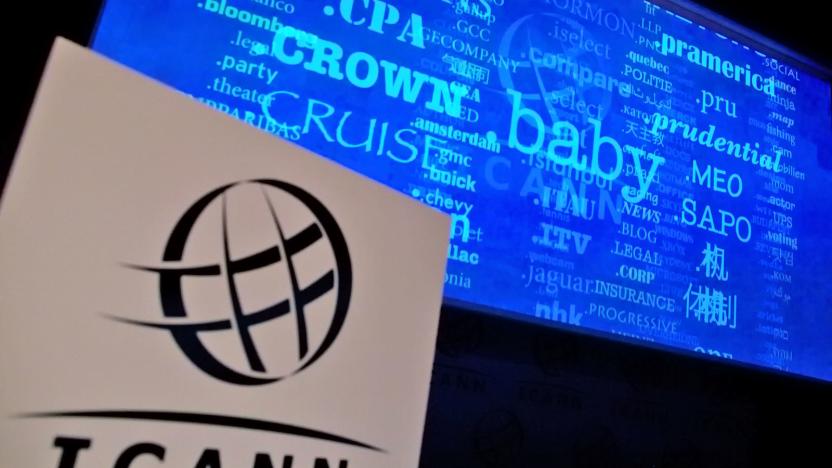NTIA
Latest

NTIA's interactive broadband map highlights the digital divide
The US now has its first interactive map highlighting the 'digital divide' where broadband is hindered by slow speeds and poverty.

Foreign state hackers reportedly breached the US Treasury (updated)
Hackers backed by a foreign government reportedly breached the US Treasury Department and NTIA, stealing info in the process.

Trump administration petitions FCC to reinterpret Section 230 rules
Back in May, the President signed an executive order — after Twitter fact-checked him — proposing to limit the protections social media platforms enjoy under Section 230 of the 1996 Communications Decency Act. The Secretary of Commerce through the National Telecommunications and Information Administration (NTIA) has filed a petition asking the Federal Communications Commission (FCC) to conjure up rules clarifying Section 230.

US government lays out strategy to speed up rural broadband deployment
The US government has unveiled a strategy called the American Broadband Initiative (ABI), which aims to speed up broadband deployment and bring faster, reliable internet access to tens of millions of Americans who don't yet have it. More than federal 20 agencies are involved with the project, which follows President Donald Trump signing an order last month to promote rural broadband.

US reduces its internet oversight
After lengthy delays and no small amount of political opposition, it's official: the US has given up a key aspect of internet oversight. As of October 1st, the Internet Corporation for Assigned Names and Numbers (the outfit that manages the domain name system) is no longer under the watch of the US' National Telecommunications and Information Administration. ICANN is now a private, non-profit organization that will take its input from academics, companies, governments and the public. While the American government didn't really wield its influence, it no longer has that option.

US government cedes control of the internet in October
On October 1st, the US Government's National Telecommunications and Information Administration will hand over control of the internet's domain name system to the Internet Corporation for Assigned Names and Numbers (ICANN), a "multi-stakeholder" nonprofit organization. While the change will be invisible to the billions of internet users out there, starting in October, the US government will no longer control what some call the internet's "phone book." The domain name system works by associating a web address or URL with a site's IP address, and it is crucial to the way the modern web works. Since 1998, the NTIA and ICANN have had a zero-cost contract in place that gives the US government the authority over the system, although the government's role was largely symbolic. Technically, the Obama administration has agreed not to renew the contract, which expires on September 30th. ICANN, a California-based group made up of representatives from tech giants, foreign governments and other "interested parties," actually began the process of finally taking over the reins when it detailed its transition plan last year. Again, regular users won't notice a difference in their internet come October, but the switch isn't without controversy. In the past, some have argued the US should maintain control in order to prevent foreign governments from censoring their citizens. More recently, however, the Obama administration and the tech community believe it is a necessary move to maintain international support for the internet and a decentralized governing body.

Data breaches and spying fears are keeping people offline
Have countless data breaches and unfettered government surveillance left you nervous about doing things online? You're definitely not alone. The US National Telecommunications and Information Administration has conducted a survey revealing that nearly half of the Americans it surveyed (41,000 homes) have scaled back their internet activity over privacy and security fears. About 29 percent have avoided online finances, while 26 percent skipped online shopping. A similar amount decided against posting on social networks, and 19 percent even decided against offering "controversial" opinions online.

The US won't end its internet oversight for another year
If you were looking forward to the US relinquishing its internet oversight at the end of September... well, you'll be disappointed. The Department of Commerce has delayed the transition by "at least" a year. Simply put, the community isn't yet ready to take the reins -- it won't have time to both submit and implement its plans, which need a government rubber stamp to go ahead. The breathing room should give ICANN and friends a smoother transition that keeps the internet's domain name system out of the hands of governments and other parties that might want to limit free speech or privacy. There's no certainty that this is the last delay, but the Commerce Department can extend its ICANN partnership for up to three more years if there's a particularly serious logjam.

US to write privacy rulebook for commercial and civilian drones
You may not be able to fly your drone wherever you want, but there's no rules on what you can actually do with it. That's likely to change, with Politico reporting that President Obama will tell the NTIA to draw up privacy guidelines for unmanned aerial vehicles. The rulebook will only cover commercial and hobbyist activities, but should stop nefarious eyes from straying too close to your bathroom window when you're not looking. Military and law-enforcement hardware, meanwhile, will require separate rules, which is likely to come from individual states. When asked, the White House gave issued a standard no comment, but let slip that an "inter-agency process" was underway to co-ordinate America's stance on drone use. Of course, since commercial drone use is still banned in the US -- with some exceptions -- there's at least time for the government to thrash out a cohesive policy on the matter.

US to reduce its oversight of a key internet governor, but don't expect big changes
The US government has been gradually reducing its influence over the internet ever since it offloaded domain management responsibilities to ICANN back in the late 1990s, and today it took an important (if mostly symbolic) step toward severing those connections for good. The Department of Commerce has asked ICANN to work on a transition plan that will end American monitoring of the firm, letting it run independently. The only major stipulations are that the resulting system is free of government control, maintains cooperative governance and fosters an open internet. The transition was always going to be in the cards at some point, but the proposal request is a gesture toward an international community worried that a surveillance-happy US has too much say over what happens online. Don't be too quick to celebrate, though. A big policy change is unlikely, at least in the short term -- the Commerce Department has only had limited practical control. Also, ICANN itself only has so much reach. While it does watch over domain names and network addresses, it can't completely block sites or open them up to spies. At the moment, the shift is more about fulfilling promises and reassuring global partners than anything else.

White House telecom advisor brings together privacy code of conduct for apps
The White House's main telecom adviser, the National Telecommunications and Information Administration (NTIA), has issued a first draft of a mobile apps code of contact, with the goal of giving consumers more control of their privacy. It facilitated its creation over several years by stakeholders like privacy advocates, app developers and gatekeepers like Apple, Google and Blackberry. If adopted, publishers will be required to provide "short form notices" telling consumers whether or not their data is being collected and how it's being used. Such data would include biometrics, browser history, phone or SMS logs, contact info, financial data, health, medical or therapy info, user files and location data. The document was backed by the American Civil Liberties Union, though it wasn't crazy about the amount of time the process took, saying that "comprehensive privacy legislation" was also needed. It's worth noting that major app store operators already agreed recently to put new privacy policy standards in place that conform with California's Online Privacy Protection Act. There's also the irony of the US government pushing for more consumer privacy, while perhaps being the largest abuser via PRISM. Dig into the source for the full read.

White House mandates that federal agencies make better use of spectrum
The White House has long been calling for smarter use of spectrum among federal institutions, and it's translating some of those words into deeds through a new Presidential Memorandum. The new set of guidelines requires that agencies wanting spectrum prove that they've both explored alternatives and will make efficient use of the airwaves they'll get. The NTIA also receives an expanded role under the mandate: it should offer wider access to government-owned frequencies and work more closely with the private sector. Not much changes for the FCC, though. The White House wants it to largely stay the course and prevent carriers from hogging spectrum. Accordingly, we're not expecting a sudden surge in wireless capacity as a result of the memorandum; it might, however, cut back on some waste.

White House responds to petition: unlocking phones should be legalized
The recent ruling that effectively bans third-party phone unlocking has ruffled more than a few feathers, and the people have spoken with their electronic signatures -- 114,322 of them, to be exact. Now the petition to the White House, which asks that DMCA protection of phone unlockers be reconsidered, has finally received an official response, and it appears that it's for the positive. The author of the letter is R. David Edelman, Senior Advisor for Internet, Innovation and Privacy. "The White House agrees with the 114,000+ of you who believe that consumers should be able to unlock their cell phones without risking criminal or other penalties," Edelman writes. All told, the response matches that of the National Telecommunications and Information Administration (NTIA), which wrote a letter to the Librarian of Congress in support of extending the exemption last year. So what does this mean for us? Edelman states: "The Obama Administration would support a range of approaches to addressing this issue, including narrow legislative fixes in the telecommunications space that make it clear: neither criminal law nor technological locks should prevent consumers from switching carriers when they are no longer bound by a service agreement or other obligation." We're not going to see immediate change, but it appears that a chain of events is now in motion in which the FCC and Congress potentially play a huge role. We're not out of the woods yet, but it's relieving to see such a positive response -- along with a call to action -- from the government. Read the response in its entirety below.

Mobile Miscellany: week of January 28th, 2013
If you didn't get enough mobile news during the week, not to worry, because we've opened the firehose for the truly hardcore. This week brought a resolution to HTC's kerfuffle with the custom ROM community, along with a handful of special edition Samsung smartphones and new efforts toward spectrum sharing with the US government. So buy the ticket and take the ride as we explore the "best of the rest" for this week of January 28th, 2013.

Department of Commerce and NTIA suggest spectrum sharing for government and commercial services
In 2010 President Obama stated, in no uncertain terms, that our country's competitive edge and technological leadership were conditional on our ability to open up broad swaths of spectrum for commercial and governmental use. Two years later, we've made progress, but our wireless providers are still struggling to keep up as our demand for cellular broadband skyrockets -- even spectrum hog Verizon claims to be gasping for air. The Commerce Department and US National Telecommunications and Information Administration are suggesting a new approach to opening up the airwaves to carriers that doesn't involve the wholesale abandonment of radiowave real estate by its current residents. The NTIA thinks there is room for both federal agencies and companies in the 95MHz between 1755 and 1850MHz. This would open up the prime spectrum to commercial use, but would also save the time and money normally needed to relocate existing government services which, in this case, includes military communications and missile guidance systems. In typical bureaucratic fashion, more study will be needed before a formal recommendation can be made to the FCC. But, there's plenty more detail to be had in the meantime -- just check out the PR after the break and the full report at the source link.[Tower photo via Shutterstock]

LightSquared grasps at straws, slams FCC in a statement
To say it's been a bumpy road for LightSquared over recent months would be an understatement. However, developments this week could see the beleaguered company reach a critical fork in the road. On Tuesday, the National Telecommunications and Information Administration confirmed that LightSquared's planned network would indeed interfere with global positioning systems, and that there was no "practical way" to work around this. The FCC subsequently proposed to indefinitely suspend LightSquared's authority to migrate its satellite spectrum to land-based use. Unsurprisingly, this evoked a less than cheerful response from the troubled startup, which slammed the FCC in a statement, claiming it's "harmed not only LightSquared, but also the American public" and accusing the committee of "the height of bureaucratic irresponsibility." The following day, the Wall Street Journal reported that firm was now making a last-ditch effort to revive hope, by attempting to exchange its wireless licenses for ones similar to those operated by the Department of Defense. Reuters has since reported that contrary to rumors that the company was seeking restructuring advice, hedge fund manager Philip Falcone claims that filing for bankruptcy would be off the cards, defiantly stating "there are other ways around this." As to what these other ways include we're as yet to see, but we admire the optimism.

FCC to dash LightSquared's bid for LTE glory
Many of us have seen this coming for some time now, but the FCC issued a statement late today that it intends to reject LightSquared's bid to create a wholesale LTE network on the basis that interference with existing GPS devices is unavoidable. The news follows a similar recommendation from the NTIA that was delivered to FCC Chairman Julius Genachowski today, which concluded "there are no mitigation strategies that both solve the interference issues and provide LightSquared with an adequate commercial network deployment." For its part, the upstart wireless provider responded that it "profoundly disagrees" with the NTIA's conclusions and remains committed to finding a solution -- easier said than done. You'll find that statement in its entirety after the break.

Leaked draft shows LightSquared's network interferes with 'great majority' of GPS receivers, company pushes back
According to leaked reports from government test drafts, LightSquared's technology causes "harmful interference" to the majority of GPS receivers. Addressing the allegations, LightSquared called the conclusions "patently false." It added, "We are outraged by the illegal leak of incomplete government data to news organizations. This breach attempts to draw an inaccurate conclusion to negatively influence the future of LightSquared and narrowly serve the business interests of the GPS industry." The company believes tests are inconclusive because they were completed at power levels up to 15 times higher than those that would be used in practice. By ignoring its commitment to work at a lower level to minimize interference, the company believes the conclusions are erroneous. It's important to note, however, that the NTIA will make the final determination about how many devices passed or failed, rather than the documents makers. And that assessment has not yet been made. Despite the ongoing dispute, the company has already managed to secure 30 partners ranging from Sprint to Best Buy, all hoping to cash in on a promised $7 per gigabyte price point. The FCC has given LightSquared the go-ahead to build the network, but will not allow for activation until approving the final round of government testing. Amar Toor contributed to this report.

United States gets a National Broadband Map, finds much of its nation doesn't have broadband
The FCC of the Obama administration has been very keen to highlight the fact that many Americans today still aren't riding the information superhighway, a mission of awareness-spreading that was advanced a little more yesterday with the introduction of the National Broadband Map. Mostly the work of the National Telecommunications and Information Administration, this $200 million project provides broadband data for thousands of providers with over 25 million searchable records -- all of which can be visualized in map form, categorized by connectivity type, or downloaded in full to your computer. APIs have been made available for anyone interested in remixing / using the NBM elsewhere, while information updates are promised every six months. In terms of the maps' content, we're still seeing unsatisfactorily wide swathes of broadband-free countryside, but we suppose the first step to fixing a problem is admitting you have one.

FCC grants LightSquared terrestrial-only waiver, puts an end to LTE drama
If you've been following the drama over LightSquared's application to build a wholesale integrated broadband / satellite network, it's time to put away the tissue box and toss out the bonbons. That's right, the FCC finally approved the company's conditional waiver for an ancillary terrestrial component integrated service rule. In other words, the entity gave LightSquared the green light to offer terrestrial-only phones, in addition to satellite service, as long as interference problems are addressed before the company starts building its network. Just two weeks ago, it looked like the FCC might strike down the proposal on a recommendation from the National Telecommunications and Information Administration (NTIA), which warned of potential interference on the SMS network with the likes of Department of Defense Communications. LightSquared remained silent during deliberation, but following the FCC's decision, both parties gave a thumbs up to the outcome. Honestly, we could have done with a more heated back and forth, but we'll leave that to the professionals. What time is Bridalplasty on again?









